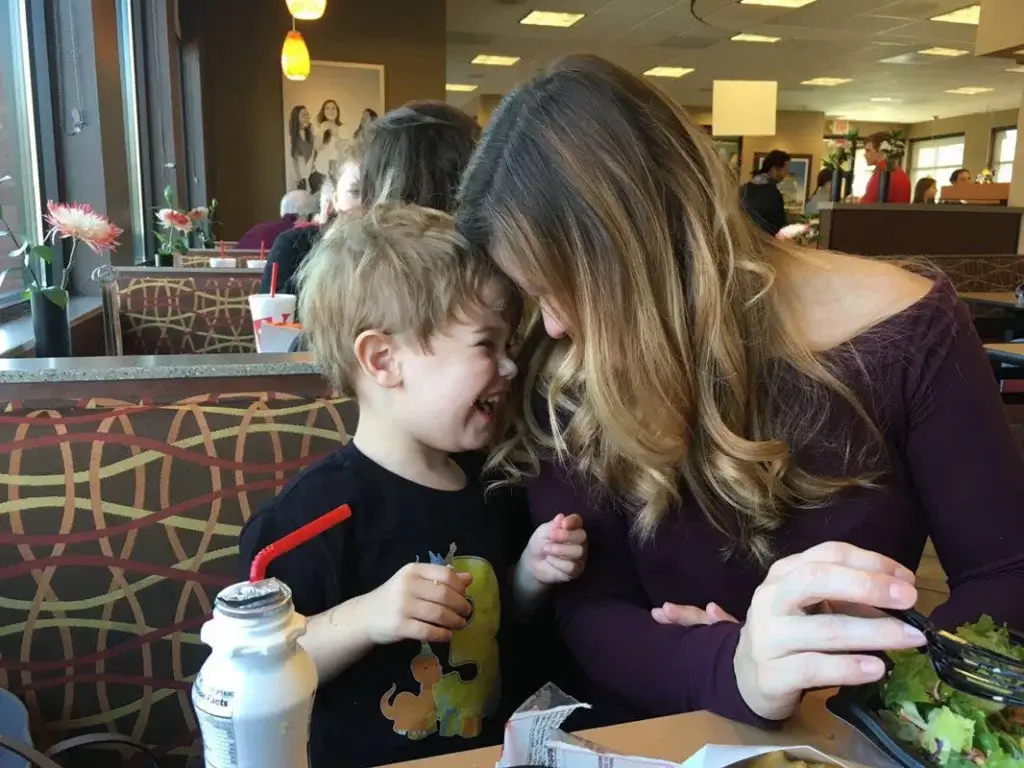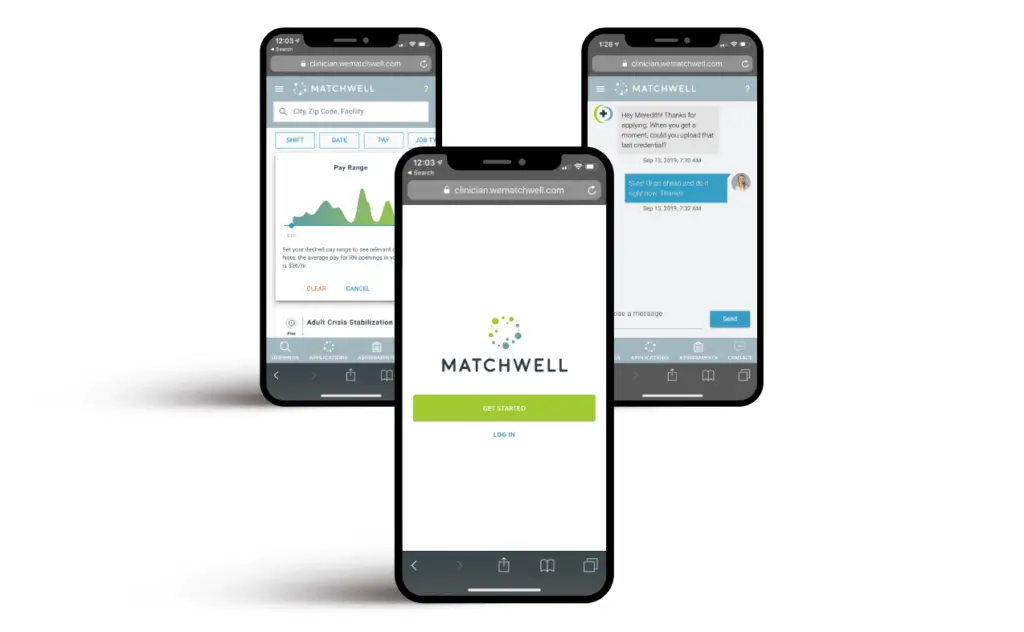As a working mom and nurse, I know first hand how difficult it is to care for patients, care for your own family, and then (if you have time) care for yourself. During my career as a nurse, I have worked all sorts of jobs and hours: 12 hour shifts, 8 hour shifts, part-time, per diem, and full-time. I’ve worked in direct patient care, clinical education, and administration. I even worked full time and attended graduate school for my FNP while caring for my then 3 year old son and giving any time left to my husband (he is such a champ!)
There were plenty of times over the years I asked myself, Why am I doing this? It would be so much easier if I just stayed at home and focused solely on my family. Why did I continue sacrificing time with my own family on holidays, snow days (I have still never seen my son play in snow because I was always called into work), and consistently miss family time in the evening? There is a simple answer: there’s a steadfast pull in my heart to leave this world better than I found it, and I want to accomplish this in healthcare.
Anyone who talks to me more than a few minutes knows I live and breath being a nurse. It is truly a calling to me, and I wear my nursing degrees as badges of honor. Yet, despite my passion and confidence in my calling, I still struggle with all a mixture of antithetical emotions – questioning why I keep coming back despite the down sides? It’s easy to find articles, blogs, and research on the negatives of being a working mom – specifically with nursing. I read so many stories and quotes that shed some light on being a #nursemom. The good news was that I wasn’t alone. The bad news was, the majority of the time, that light was negative.
In today’s society, approximately 70% of women with children participate in the workforce, which is a 23% increase over the last 40 years. Nursing is also dominated by women, with approximately 91% of nurses being female. While that number is slowly evolving and men are entering the healthcare workforce as nurses, females remain the majority and will likely hold that title for some time.
As a #nursemom, these statistics resonated with me so much that my graduate research focused on the duality of being a working mother. What my research partner (Lauren) and I discovered is that, despite the obvious downsides to being a working mother, there were lots of benefits too. So, I knocked the dust off of that project (along with the boring research rhetoric) and polished it up in an effort to help nurse moms know they are not alone, as well as celebrate the power of the work they are doing. Here we’ll take a look at the positives, problems, and possibilities for the #nursemom.
Positives
Lauren and I were overwhelmed by the positive themes identified by the group of working nurse moms. The expected overtones of guilt and imbalance were jarringly eclipsed by the positives of being a #nursemom. For our research method we used a genre called photovoice. What’s interesting about photovoice is that it was created by Caroline C. Wang and Mary Ann Burris to help women living and working in the village of Yunnan Province, China have a voice and bring to life the reality of their day to day lives. Photovoice is personal images with personal captions: it is a tool to empower. So we thought, what a great mechanism to give women in our nursing community the same power.
PRIDE
One key theme identified in the photovoice exercise was pride. Pride overshadowed negative feelings of guilt, imbalance, and exhaustion. Pride was encompassed in the images captured that represented nurses chasing their dreams, caring for others above themselves, and financial independence.
 One picture was of a coffee mug and a note that read Being the woman I aspire to be. This was a note to a participant from her daughter. The participant wrote below the image, This was a Christmas gift from my oldest daughter. She wrote 30 reasons she loves me, this was the last one. It made all the hard work of balancing work, home and family really worth it.
One picture was of a coffee mug and a note that read Being the woman I aspire to be. This was a note to a participant from her daughter. The participant wrote below the image, This was a Christmas gift from my oldest daughter. She wrote 30 reasons she loves me, this was the last one. It made all the hard work of balancing work, home and family really worth it.
At this moment, this #nursemom recognized the amazing impact she had made on her daughter by setting a strong example, and that her influence would have a lasting effect.
The balancing act of juggling work, motherhood, and homelife all paid off in this one moment, and with one sentence. Setting an example as a strong female who obtains her dreams while daily impacting the lives of strangers is not something many get to boast, and what a privilege to be an example of following your passion and helping others!
FINANCES
Financial independence was another positive theme noted. While most nurses do not go into the profession for money, there is still money to be made. This particular nurse took a picture of her beautiful home, recalling that as a child she only dreamed of living in a large home. She credits the materialization of that dream to her financial contributions within the family. If she didn’t work, she would not have that home. She also credits the flexibility of nursing – the demand of her role, which allows her to work more when she chooses, and the ability to easily increase her rate by working night shift instead of day shift.
Overall, the positives of being a nurse mom outshined the problems. While this was not the anticipated outcome, it’s refreshing to know a different theme is emerging among working moms. Perhaps, as women, we’re starting to embrace our dual role and dropping the burden of guilt we’ve been conditioned to feel; opting instead to celebrate our accomplishments and ability to do it all (or at least most of it!)

Problems
I’m a realist at heart. Some might even say unsentimental (ask my husband). What I won’t do is gloss over the reality and hardships that accompany being a #nursemom. There’s an ever-present hum of anxiety that permeates most moments of my life. Is this exclusively because I’m a #nursemom? No! It’s how I’m wired. But what I’ve learned over the years is that a lot of my nurse sisters are wired that way too.
When I’m not working, I’m thinking about work and worrying that I’m not giving enough to my job. When I’m working, all I can think about is my family and that I’m not giving enough time to them. These combatting thoughts are so common they actually have a name – crossover. Interestingly enough, these feelings were also noted by our research participants. And, if it isn’t already apparent, the culmination of crossover leads to guilt and burn out.
CROSSOVER
Crossover occurs when the lines between work and personal life become blurred. Technology is a huge contributor to the crossover effect. You no longer have to be physically at work to access work, and in nursing it’s the same.
Many times, after my shift ended, my brain continued to play out what I should have done and worried about what I didn’t do. Technology allowed me to play into those thoughts and check on patients by texting my co-workers in the middle of the night. I remember waking up around 2am one morning in a sweat because I thought I forgot to run a lab on an infant. I called into the nurse’s station only to be reassured that I did draw the lab and that everything came back normal.
And when I was at work, I worried about my husband and son. I wondered what they were doing; if they were ok. I would check in throughout my shift and then, while feeling guilty about not being at home, I would feel guilty about stepping away from my patients for a moment to check in at home. It was a never ending cycle.
GUILT
Guilt was another prevalent theme in our research. One participant wrote, They missed me when I stayed home full-time and left them for any reason, and they miss me now working 5 days a week. It’s a struggle at times to feel balanced – to feel like I’m giving enough to all commitments. There are lots of reasons #nursemoms feel guilty. Maybe we’re missing Christmas morning, dinner time, homework, school programs, or first steps. We might feel guilty because we weren’t there to hold a patient’s hand in their last moments of life because we were with our family Christmas morning or watching our child at the school play. Honoring your calling, especially when you have a dual calling, is complex.
BURNOUT
The equation is simple: crossover + guilt = burnout. When caring for others is your job at work and at home, it’s hard to find time to care for yourself. It’s estimated that nearly half of all nurses have considered leaving nursing all together because of the increased workload. Long shifts, more patients, sicker patients, and lack of resources make even the most dedicated nurse dream of an easier job. Our photovoice research also captured burnout through pictures of messy bedrooms, messy kitchens, messy cars, and lots of coffee cups. The #nursemoms in our research group were tired.

Possibilities
You may be thinking, great now I know the pros and cons, but what are my options?
QUIT
Depending on your financial situation, you may not have to work. Some of the best career advice I’ve received is, You will never regret not working or working less, but you will always regret time missed with your family. This always runs through my mind anytime I am considering a promotion, changing my career path, or increasing how many hours I’m working. Will the new position interfere with seeing my son grow up? Will it cause me to miss time at the gym or care less for myself? For me, it’s important that I can go on field trips, be at home with him when he is sick, and eat lunch with him at school. Leaving the nursing profession altogether is a legitimate option (and sometimes the best decision) for many moms. But, before taking that plunge, you should consider the losses.
-
IF YOU DON’T USE IT, YOU LOSE IT
Nurses know that most of our skill set is maintained and improved from being used everyday. This isn’t exclusive to nursing. Most adult learners learn and grow by actively applying their skills everyday. Stepping away from the nursing profession, even if just for a period of time, will come with a loss of skill set. But once you step back in, often times your muscle memory takes over and you’ll be back to your expert skill level in no time – just like riding a bike.
If you decide to step back, consider joining your state’s nursing association, such as the Georgia Nurses Association. They provide seminars that can help you maintain your skillset, and a community of nurses that you can network with. It’s also important to make sure you’re aware of your state’s requirements when it comes to maintaining your license. Most states require continuing education, especially if you aren’t working.
-
WHERE’D THE TIME GO?
If you decide to quit nursing, or step back for a period of time, there is also the lapse on your resume to consider. Don’t get me wrong, this is nothing to hide or be ashamed of. Lots of workers take a break for many reasons: travel, caring for sick parents, raising children. When you get ready to step back into the workforce, you simply have to own your absence. Don’t brush over it or try to hide it. Many clinicians include the period away as another entry on their resume. Trust me, recruiters and hiring managers notice when there’s a lapse. You might as well call it out yourself. This can also help ensure they don’t make a false conclusion that can hurt your chances of landing a job.
-
KEEPING UP WITH THE TIMES
Health care constantly evolves. What’s best practice today will likely not be best practice next year. Recent experience is defined by most organizations as within the last year. Be prepared to enter a nurse residency program if you’ve stepped away for a bit, which also means a lower starting pay rate. The first nurse residency I was in consisted of brand new nurses like myself, but there were also lots of experienced nurses re-entering the workforce; one of my closest nurse friends included. Their maturity and previous experience was invaluable to me even though we were all learning the same policies and procedures. They were able to impart wisdom they had garnered through experience that wasn’t going to be in a text book; like nursing practice is not black and white, but gray.
CUT BACK
I cut back to working just 12 hours per week when my son was first born. While I did miss out and was constantly catching up when I did work, this allowed me to maintain my position within the organization AND be at home to raise my infant son. I didn’t have to put him in daycare until he was over a year old, which was important to me as I was exclusively breastfeeding.
However, I still had to commit to some weekends, and was called upon for those dreaded ice storms that like to torture Atlanta around the beginning of each year. And, despite my new found flexibility, there was still an underlying fear that I was going to miss out on something at home.
If you cut back hours and are working in direct patient care, you also have to consider being cancelled. As you probably know, when the patient census is down, per diem nurses are usually the first to be cancelled. If you’re depending on the money, the lack of consistent income can create added stress.
ENTER THE GIG ECONOMY
Thankfully, a third option is just on the horizon. An option where you don’t have to quit, take an extended break, or commit to the scheduling parameters of a part time job. Imagine being able to pick up a shift at a healthcare facility almost as easily as grabbing an Uber. A work process that consisted of opening your phone, selecting the facility you want to work at and the openings that work for your schedule. You could work 1 day a week on your terms with no commitment to holidays. Or you can work 3 days a week at 3 different facilities. A system where you could stay up to date on your skills, limit the resume gap, and find balance between being a nurse and being a mom that doesn’t burn you out. Meet Matchwell.
Matchwell is an online platform where nurses take control. We’ve started a revolution. We’re building the largest nurse community in the world full of nurse moms just like you that believe there’s a better way to work.

Here’s How It Works
Join
Matchwell is 100% free for nurses, only takes seconds to reate an account, and comes with a free credential portfolio. Tell us about your experience, when and where you’d like to work, and your preferred pay rate.
Apply
Browse openings and apply to the ones that work for you. Matchwell even gives you the ability to communicate directly with the hiring manager if needed. We are not an agency. In fact, we’ve removed the middleman to provide a more transparent connection between you, the nurse, and the facilities you apply to.
Work
Once approved for an opening, the hiring manager coordinates onboarding with you and provides first day instructions. You do great work and rate your experience once the assignment is completed.
The Result
All benefit from this new process. Nurses are empowered to set their own schedule and achieve the work-life balance they greatly need, facilities gain access to the clinical staff they desperately need (while avoiding heavy fees incurred through the usage of staffing agencies), and both are able to focus more on providing excellent care to their patients.
Join the Revolution
We’re currently seeking nurses who believe in our mission. We’ve partnered with multiple organizations across Georgia that are adding openings to the platform, and will continue to grow the flex work opportunities. But, as with any revolution, we can’t do this without you. Even if you aren’t looking to make the change yourself, join our community to support other nurses who need more flexibility.
 Being a nurse is my calling. Being a mom is my privilege. Advocating for other nurses, such as yourself, is now my passion.
Being a nurse is my calling. Being a mom is my privilege. Advocating for other nurses, such as yourself, is now my passion.
P.S. As I’m writing this, my five year old son is directing a superhero dinosaur war. #momlife

